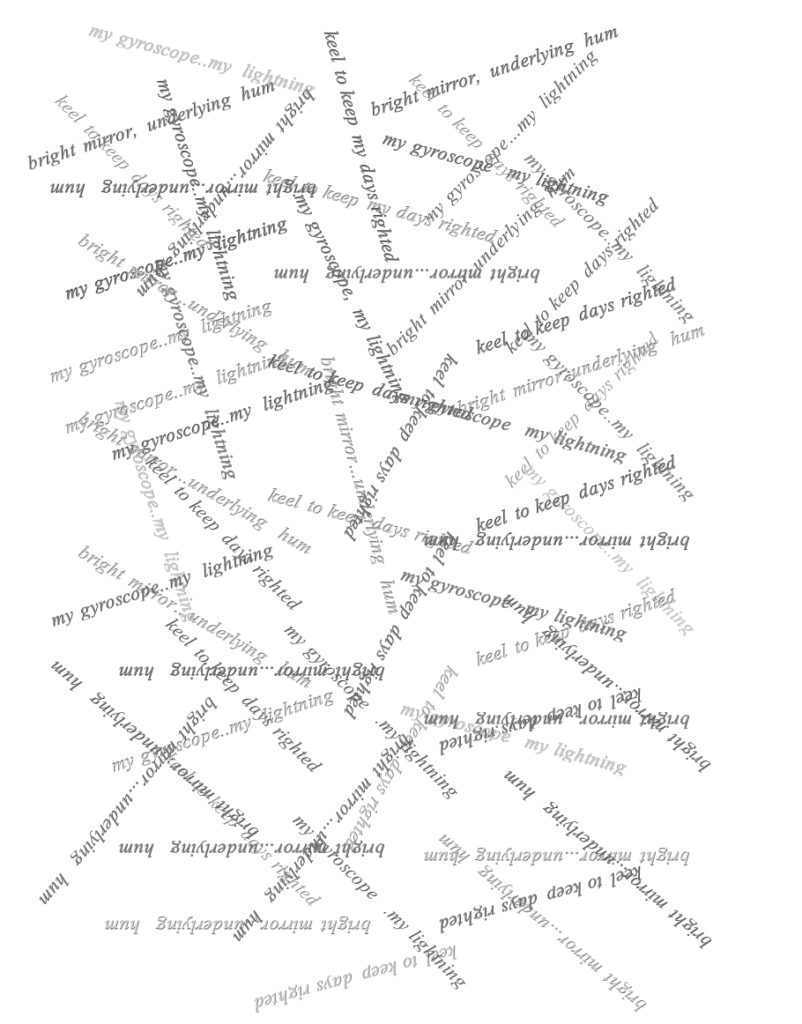W.J. Herbert, featured in the new Ocean State Review
Crossfire Highway
When I woke,
she was dead
but I wouldn’t have left her,
even after Ruthie & I had decided where her grandmother would have liked to be buried
& who would do it & when
but, by then,
dusk had claimed every streak of shine
& we were left with the kind of darkness that in Sonoran winters comes on suddenly
& so we took off faster than we should have over the pass & dropping
down into the valley’s
rainy basin
turned on the wipers but couldn’t get the windshield clean:
rain slapping glass, whoosh of the blades’
frantic slashes, high beams coming
at us, daggered & jabbing
the night alive
with relentless
blindings.

W.J. Herbert on “Crossfire Highway“:
After finishing my debut collection, Dear Specimen, [Beacon Press, 2021,] I wasn’t looking for a radically different way to approach the page, though I was intrigued by contemporary collections that contain visual poetry, such as Diane Khoi Nguyen’s Ghost of, Don Mee Choi’s Mirror Nation, and Paisley Rekdal’s West: A Translation. After revisiting these collections, I realized that the four italicized lines which are left justified at the bottom of “Crossfire Highway” (OSR Vol. 13, No. 1) deserve a more imaginative setting than I’d given them.
In my newly-completed manuscript, “The Golds on Each Radiant Spoke,” they appeared for a long time right-justified at the bottom of the otherwise-blank page that followed “Crossfire Highway.” I positioned them there, in white isolation, to invite the reader to share in the speaker’s grief. But as the manuscript evolved, it became more essential that they embody the panic the speaker felt the day of her mother’s death.
Rather than investing in a graphics program which would require a steep learning curve, I decided to see if my Word for Mac 2016 might work. It took some time, but I was able to create a page in which the jagged overlap of the five italicized lines felt as lacerating as the lights which pierced the heart of the speaker.
While “The Golds on Each Radiant Spoke” isn’t strictly autobiographical, some of the speaker’s experiences resemble my own. The frought highway, in particular. But other poems revolve around the three generations of women who love the endangered Peninsular bighorn sheep and the fragile desert habitat they depend on.
The second half of the manuscript contains a single long poem, “Ballad of Dunes & Glass.” While I was able to juxtapose italicized desert sections with the speaker’s ongoing experience of gothic cathedrals, there was little opportunity for visual exploration. But inspired by what contemporary poets are doing to enliven the page, I hope to create new work which captures this distinctive energy.
W.J. Herbert’s debut collection, Dear Specimen, (Beacon Press, 2021) was a winner of the 2020 National Poetry Series and awarded a 2022 Maine Literary Award for Poetry. Winner of the 2022 Arts & Letters/Rumi Prize for Poetry, Herbert’s work also appears in The Atlantic, Best American Poetry 2017 & 2024, The Georgia Review, The Hudson Review, The Southern Review, and elsewhere. She lives mostly in Portland, Maine.

